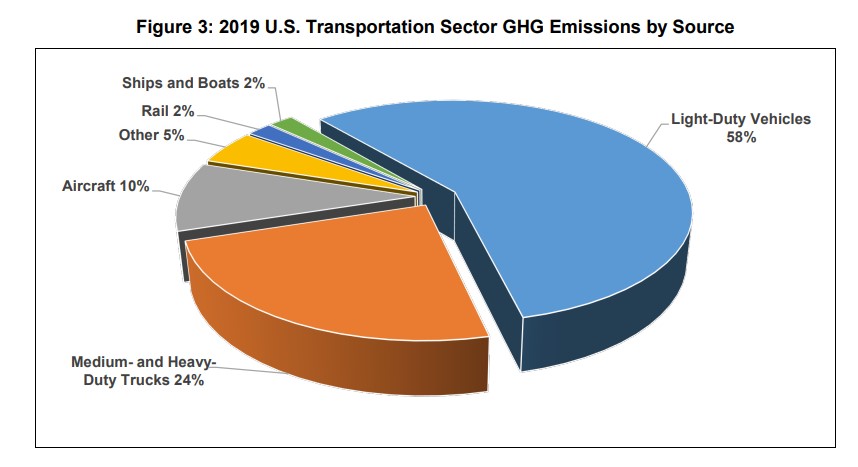Hydrogen fuel cell trucks are most environmentally friendly: ATRI
Hydrogen fuel cell trucks are the most environmentally friendly zero emission vehicle option for longhaul trucks, although the technology is not presently feasible for longhaul operations, new research revealed.
The report by the American Transportation Research Institute (ATRI) showed that while electric trucks have no direct tailpipe emissions, CO2 production associated with vehicle, battery and electricity production would only result in a 30% decrease in CO2 emissions when compared to a standard diesel truck.
The marginal environmental benefits of electric trucks are due, in large part, to lithium-ion battery production – which generates more than six times the carbon of diesel truck production.

The research, which utilized outputs from the Argonne National Lab’s GREET Model, also incorporates CO2 emissions that generate from the U.S. electrical grid – which still relies primarily on fossil fuels.
This analysis utilized federal and industry-sourced data to identify and compare full life-cycle CO2 emissions for a range of truck types, including a baseline diesel truck, battery-electric trucks and hydrogen fuel cell trucks.
“The U.S. trucking industry is strongly committed to carbon-reduction efforts, and electric motors and drive trains offer many additional performance and maintenance benefits,” said Hugh Ekberg, president and CEO of CRST. “But ATRI’s research highlights that several of the leading zero-emission approaches being advocated today still need additional research to fully understand how the different technologies can be best developed and utilized to maximize carbon reduction.”
Additional strategies
The report concludes by identifying additional strategies that can reduce CO2 truck emissions for all three energy sources – diesel, electricity and hydrogen.
For example, renewable diesel could decrease CO2 emissions to only 32.7% of a standard diesel engine without requiring new infrastructure or truck equipment.
Hydrogen sourced from solar power electricity could enable hydrogen fuel cell trucks to emit only 8.8% of the baseline diesel CO2.
Have your say
This is a moderated forum. Comments will no longer be published unless they are accompanied by a first and last name and a verifiable email address. (Today's Trucking will not publish or share the email address.) Profane language and content deemed to be libelous, racist, or threatening in nature will not be published under any circumstances.
-
Ivar, what advantage would you have if you were using a large truck converted to run on hydrogen if you never had to worry about hydrogen gas infrastructure or hydrogen fueling stations, which are few and far between at this time? Because of the size of the truck, or even a large ship on the seas, there is room to build a propulsion system that would produce all the hydrogen gas you would need right on-board the craft or truck. We at Global Power Reduction, Inc. have proven that we can produce clean hydrogen by using a dry chemical mixture in a reaction chamber, then feeding a measured amount of a liquid formula to the reaction chamber that gives you instant clean hydrogen gas for the fuel cell which is produced On-site (on-board) and on-demand. This means having enough fuel constantly that is produced wherever you need it and whenever you need it, making it unnecessary for fueling stations. We have proven this more than 15 years ago, and have demonstrated it many times, including to NASA at Kennedy Space Center. Take a look at http://www.globalpowerreduction.com which is our website and click on the video there which tells you a little more about us. Best wishes, Ken Hudson
It really seems to be that renewable diesel may serve as a short to medium-term solution to help reduce trucking carbon intensity. I, for one, would rather fix up my old 1983 cabover powered by a CAT and run Neste’s renewable diesel than try to run a more-complicated and less reliable (in extreme cold and seems in general) Tier 4 emissions modern truck. In the end, without having to regen, the old truck uses significantly less fuel. With the historically highest diesel prices now, renewable diesel is cost-competitive. Neste is entering into an agreement with Enviva coal-replacement bio fuels from trees and waste sawdust to research a process that will provide a source of crude-equivalent to put through their new biofuels refinery. Renewable diesel-electric drivetrains would be close to the efficiencies of a hydrogen fuel cell, but with an easy to store and use fuel. I’d like to build one to use on the haul road to Alaska’s north slope to see how this would hold up in austere Arctic conditions, but will have to wait until I can find a wrecked electric drivetrain truck to source parts. The manufacturers of electric truck drivetrain parts so far have not been willing to sell to an individual or small business that is not an OEM manufacturer buying in bulk.